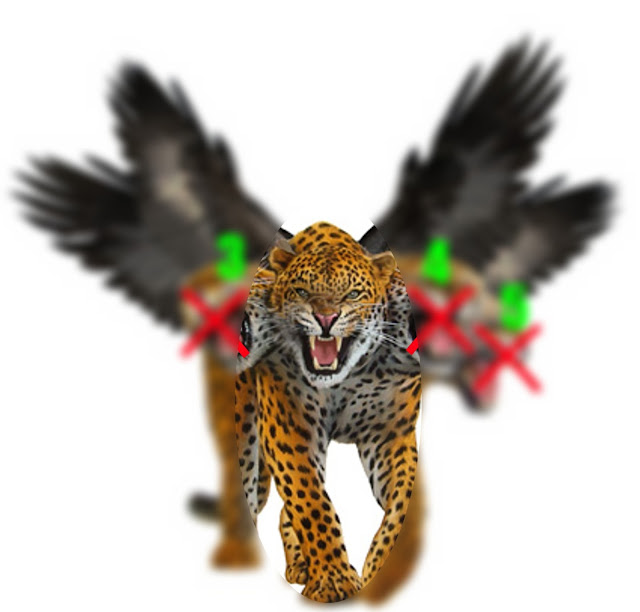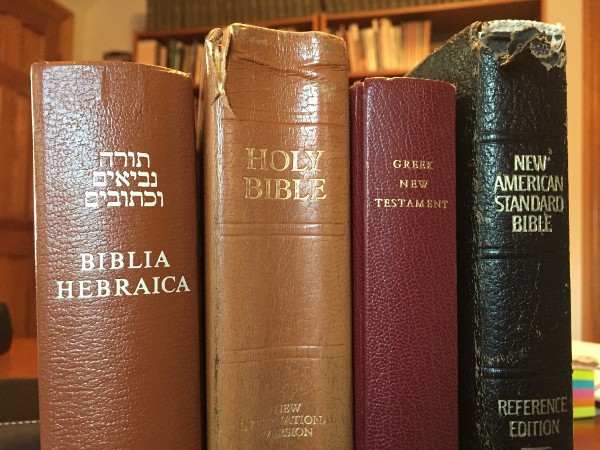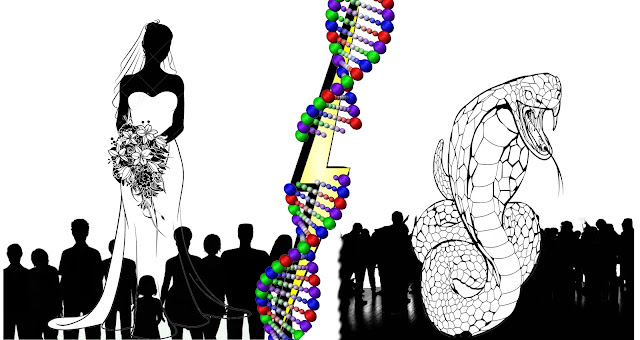Who are the 7 kings?
And there are seven kings: five have fallen, one is, the other has not yet come, but when he does he shall stay a little while. And the wild beast which was but is not, is also an eighth [king], but is of the seven, and goes away into destruction - Revelation 17:10, 11
As we introduced in the previous article, namely the one entitled “ Daniel: the beasts of the past in the time of the end ” 1 understanding the number of empires described in the statue of Nebuchadnezzar's dream will lead us to understand interesting details about the little horn.
This is because Scripture has an absolutely solid internal coherence and consequently, by putting in place a piece that had previously been put in the wrong place, other things will begin to fit together that, perhaps, we no longer even thought about.
We have said that if Rome is present in the prophecy it must be part of the third realm of the statue, i.e. the copper belly and thighs.
This observation also leads us to conclude that the last kingdom is truly "different from all the other kingdoms" (Daniel 7:23) and we absolutely must not look for a similarity or even just a lineage with Rome.
Erroneously concluding that the feet of iron and clay were a kind of continuation of the previous kingdom (Rome, the legs of iron) due to the fact that both sides had iron in common, we had also concluded that Rome itself was that kingdom "different from everyone else."
Understanding instead that legs and feet are a single kingdom, we not only conclude that we must not look for a descent or a resemblance with the previous empire (in fact copper with iron mixed with clay has nothing in common) but that the latter was rightfully different from all the others .
In what sense could Rome be something "different from all the others"?
Perhaps it could have been stronger and more efficient than the previous ones, just as the leopard proved to be more efficient than the bear and the bear proved, in its time, to be stronger than the lion.
Perhaps he could have been more organized and more disciplined.
Perhaps his fighting technique was more refined… but was it really something that different?
The Romans always used swords, spears, shields, onagers, rams, ballistae…
They were really so different, so much so that the description greatly frightened the prophet Daniel, "extraordinarily frightening, whose teeth were of iron and whose claws were of copper, who devoured [and] crushed, and who trampled even what was left with his feet ”? - Daniel 7:19
Only a deep-rooted preconception could make us answer "yes".
In fact, the description of this last beast "fearful and terrible" describes the modern warfare powers very accurately.
Yes, these are "terrible and terrible" and surely they devour and crush and trample what is left when they pass by carpet bombing or make the ground toxic and infertile with their dirty weapons , white phosphorus or other terrible things .
Finally understanding that all of chapter seven of Daniel is fulfilled in the time of the end, we are now able to solve a "mystery" that until yesterday seemed truly insoluble.
Who are the 7 kings described in Revelation?
The guiding scripture of this article is Revelation 17:10, 11 which speaks precisely of seven kings and says "Five have fallen, one is, the other has not yet arrived but when he arrives he will have to stay for a short time".
We had already seen in a previous article that, contrary to what a certain religious organization teaches, the king who "is" could not be the reigning king during John's lifetime.
We had deduced this from a series of logical or scriptural reasoning.
In the article titled “Who Are the Kings of Revelation 17?” 2 was said, among other things…
“ Applying the present king of the vision to the present king in John's life ignores the context.
If, in fact, when Revelation says "one is" it refers to the Roman Empire (i.e. the power present at the time of John) why does the same reasoning not be made with the beast that "was but is not and goes away in destruction" ? - Revelation 17:10, 11
Yet both "temporal" situations are in the same context and within a verse of each other.
For consistency, also applying this expression to the time of John, we should deduce that before his exile on Patmos there existed a sort of United Nations that had just fallen into the abyss (the beast was ) and that they would be reborn in a near or distant future .
It is clear that the king is (that is, he is present) when the beast is not (that is, when he has fallen into the abyss) and the time frame to refer to is that of the vision and not that of John's life.
It is certainly not coherent, after having clearly read that John is by inspiration in the "day of the Lord" (Revelation 1:10), to apply a part of the vision to the present day of the writer" - End of quote
To this today we can add a further "difficulty" knowing that the kings that interest us are those who, in the past, were kings of the north (even if Alexander the Great, taking all the dominion, also incorporated Egypt becoming the only king ruler of his time) and consequently those who have fallen, i.e. five out of six, have fallen precisely because of the war that will break out on the day of the Lord - Revelation 7:1: 9:13-15
The enigma appeared particularly complex since of the beast itself it is said "And the wild beast that was but is not , is also an eighth king ...".
If that still wasn't enough, the next verse says "And the ten horns which you saw mean ten kings , who have not yet received the kingdom, but receive authority as kings for an hour with the wild beast" - Revelation 17:12
So the riddle to be solved was… “Are there seven kings, are they eight, are they ten, are they seventeen or are they eighteen?”.
And who are they?
And why does Scripture distinguish heads from horns and, at the same time, call both of them " kings "?
Today we can finally arrive at a reasonable conclusion consistent with the Scriptures.
As mentioned, chapter seven of Daniel is fully fulfilled in the time of the end whereby we conclude that all beasts, from first to last, will be present and participate in warfare.
As we said in the previous article, chapters seven and eight of Daniel are complementary but do not start from the same moment.
While chapter eight gives a rundown of events ( starting with ancient Medo-Persia) leading up to the end-time …chapter seven is all about the end-time.
Chapter eight thus joins chapter seven only from verse 23 onwards which says ““And in the final part of their kingdom, when the transgressors shall act to completion, there shall arise a king having a proud appearance and who shall hear ambiguous sayings…” - Daniel 8:23
So Daniel 8 also confirms that the same kingdoms, which began to clash in the distant past, will still be present in the time of the end.
In fact, the description of the "proud-looking king" was a little too similar to the description of the little horn given in the previous chapter to be coincidental.
How does this observation help us to solve the riddle of Revelation 17?
Let's reflect.
If these beasts all fight together in the time of the end it is obvious that the fallen kings must be their concern.
Since "the seventh has not yet arrived" at the point where John has that vision (and this is well beyond the war), let's focus on six for now and try to figure out who will have fallen by then and who hasn't.
 |
| The first two heads to fall are those of the lion and the bear... |
The first king to fall is the lion's head, Babylon, i.e. present-day Iraq.
The second king to fall is the head of the bear which is said to "eat a lot of meat" i.e. present day Iran - Daniel 7:5
 |
| ...of the leopard three out of four heads fall... |
Three heads out of four of the leopard fall… and we are at “ five fallen ” while “one is” .
 |
| Only one head of the leopard survives |
How can we be sure of this subdivision, i.e. how do we know that the surviving head is not the head of the lion or the bear?
Obviously we understand it from chapter eight of Daniel where it speaks of the goat that "represents the king of Greece" and from which sprout four notable horns that extend to the four winds of the sky and "from one of them sprouted another horn , small ” – Daniel 8:8, 9
The surviving horn is the one who keeps the beast alive and therefore is a king not fallen in war.
The surviving head is the king that "is," the one the angel speaks of in Revelation 17.
Before understanding the identity of the seventh and eighth kings and let's try to understand who these ten kings are, or the horns, and why they are distinguished from the heads.
Both the heads and the horns are kings but the heads are distinguished from the latter as "king of the north".
All the horns fighting together with the heads are an unknown number of powers that will be part of the lineup of the kings of the north (among these we know there is Russia due to its proximity to Iran, Iraq and Syria ) but they do not they can properly define themselves as kings of the north.
They are allied powers of this camp, just as Egypt, as the king of the south, will have several allied powers on its side who will fight during world war.
That is why we should consider Russia not a king of the north but an allied power of such kings, an armed wing or at least a "king of the north by aggregation".
The northern kings of the past remain those of the present even if their territorial influence has changed considerably over the millennia.
All the others do not become "kings of the north" for the simple fact of being their allies but they are kings nonetheless, powers that will fight together as a single composite beast.
At this point, however, since we have seen that "one has not yet arrived" (i.e. the seventh king of the north) we must understand what makes a horn, a head, i.e. we must understand what situation makes "x power " , i.e. an anonymous horn, no longer a simple horn but a king of the north.
It is evident that in the prophecy of Daniel chapter 7 this seventh head is not seen if we exclude the head of the frightening and terrible beast (a head which is not mentioned and not by chance) which in any case, if we stick to Revelation chapter 17, at most it it could be "the eighth king" and not the seventh.
What makes a power not just a power but a king of the north or a king of the south?
As we have seen in several previous articles the answer is “its direct relationship with Israel”.
This is one of the assumptions that made us realize how futile it was to look for these kings in the period of time when Israel did not exist.
Consequently, the "king who has not yet arrived", ie the one who will be seen as the seventh head at the last moment, is the power that will take the lead in the final attack against Israel.
And that is why he will have to remain for a short time because once he has gathered the various kings of the earth towards Israel (an action that will raise him as king of the north) and shortly after having destroyed Babylon the Great "he will have to come to his end".
If we are confused, let's try to imagine a hypothetical situation.
The various kings of the north present today join various powers to fight against the king of the south and his allies.
At the end of the war five out of six kings of the north fall... but obviously not all the horns fall which, it goes without saying, among these there may be powers much greater than the various current kings of the north.
Let's imagine that at the end of the war among the surviving horns there are some nations including Russia or China.
The slaughtered head seen in Revelation and recovered is, at that moment, the last surviving king of the north to whom Satan gives his power.
So regardless of the power let's not deceive ourselves: even an "insignificant" nation like Israel has the kingdom over the kings of the earth because what really matters is the spiritual background that lies behind the events.
Then this horn will rearrange the various previous kingdoms by dividing the land for a price (evidently the land near the land of Israel) also spreading south, east and towards the Decoration - Daniel 8:9
It becomes very powerful and strategically takes possession of the area near Israel.
Towards the end of the great tribulation, however, God's people somehow manage to gather from all the nations coming in the vicinity of Israel… .
Will the little horn become huge (ie the sixth head) do everything?
Obviously not.
It will warn one of the most powerful horns to its ally which will gather all the kings of the earth for the war of Armageddon.
Assuming that Russia still exists as a superpower at the end of the war, it is possible that she is organizing this attack in a big way.
So the former little horn, for the simple fact that he can appeal to a superpower like Russia, demonstrates that beyond the territorial extension and military power, he is the one who has the real power, that is, the one granted to him by Satan .
In a similar way to what Israel can do today: despite being small and insignificant, it can count on the protection of the USA and many other powers.
He will probably be the sixth king of the north to ask for help from the superpower of the moment because, precisely due to the fact that he has taken possession of a lot of land around the Splendid Country, he will obviously be the first to notice that the surrounding peoples have disappeared - Revelation 16: 12
The superpower in the forefront, therefore, will become the seventh king of the north when he organizes and launches the attack on God's people gathered on the borders of Israel.
And it will remain for a short time, of course.
So who is the eighth king?
“ And the wild beast which was but is not, is also an eighth [king], but is of the seven, and goes away into destruction” – Revelation 17:11
As we already saw in the article titled “Who is paying attention to prophecy?” 3 this composite beast is a king when acting as the sole power.
So the scarlet beast of Revelation chapter 17, a political entity that will likely see itself well formed before the war, will reform for "emergency" or "ascend from the abyss" when it meets for the second time as one power to vote the God's people to destruction – compare Psalm 2:2, 3
At this point we understand not only that chapter 17 of Revelation is in chronological order exactly like all the others (the scarlet beast is not reformed until near Armageddon in fact, until chapter 17, it still "is not" ) and we also understand that “those who wonder in awe” at that particular time period will primarily be the inhabitants of Babylon the Great – Revelation 17:8; 18:7
They are the same ones who will be taken by surprise when, believing they are protected until the last moment, they will say "Peace and security!" - 1 Thessalonians 5:3
Thanks to a deeper study of the Scriptures today we know how it is possible that the kings are four (the beasts or the parts of the statue of Nebuchadnezzar), if the (the different heads of the four beasts), seven (the last power that will act directly against Israel) and ten (all powers allied to their respective northern kings).
And we also know that the eighth king is the coalition of all these kings who will attack Babylon the Great as one before coming to destruction – Daniel 7:26, 27; 8:25; 9:27; 11.45am; Revelation 16:13-16; 7:19pm, 8pm
How do you feel as Bible knowledge continues to increase?
Should we not be grateful to Our loving Father who honors us with this great privilege?
The next article will try to identify who Little Horn might be today, i.e. the only king of the north who will survive the war.
Footnotes





Comments
Post a Comment